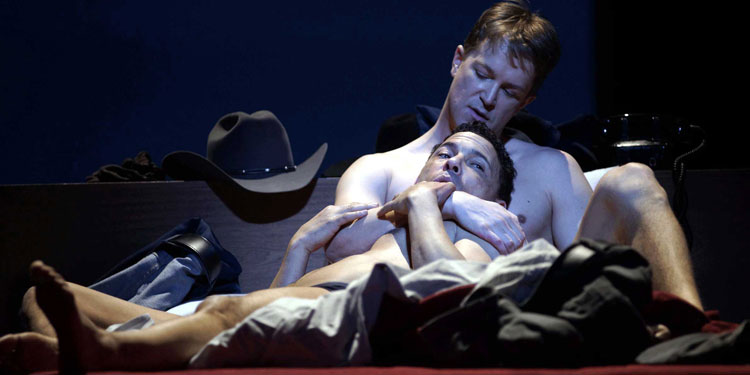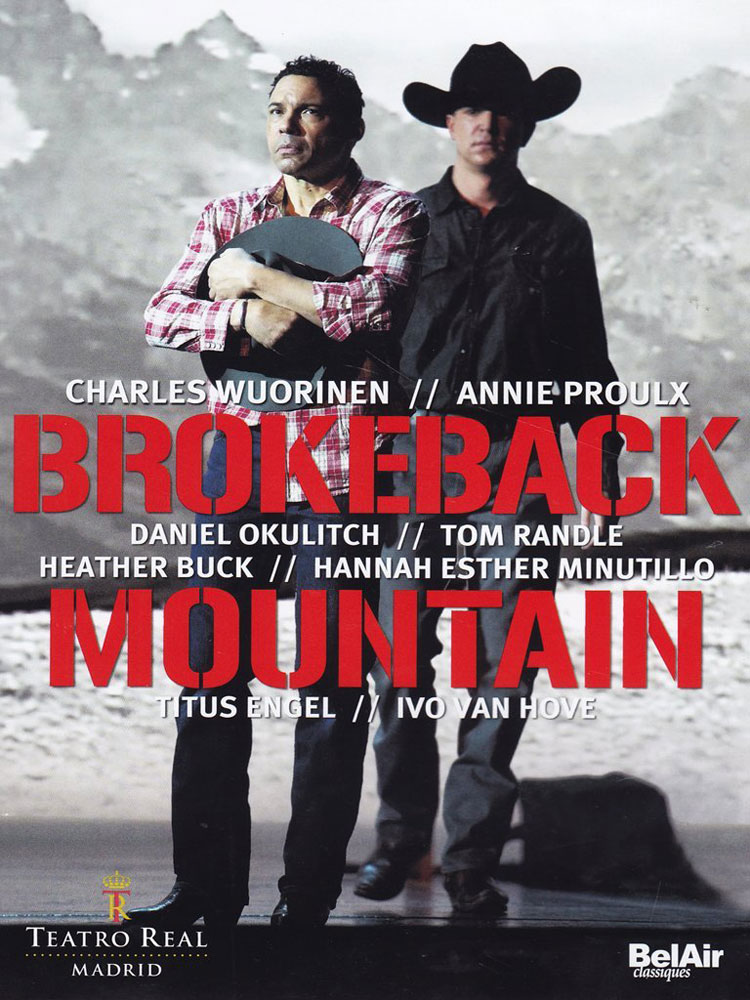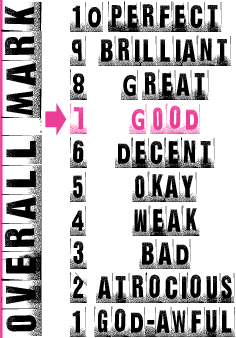
Director: Jeremie Cuvillier
Running Time: 130 mins
Certificate: E
Release Date: March 16th 2015 (UK)

Yes, there really is a Brokeback Mountain The Opera. It’s not a satire like Jerry Springer The Opera; it’s a proper, legit opera, and even has a libretto by the creator of the original short story it’s based on, Annie Proulx. It was originally written to be performed by the New York City Opera’s programme that creates new works around ideas and stories that are familiar to a younger, less elite audience. However when General Director Gerard Mortier moved from New York to the Teatro Real in Madrid, he took the piece with him.
It is initially an odd mix. Watching big, tough burly cowboys singing in a singularly operatic fashion takes some getting used to. I’m sure you’re familiar with the story though. Jack Twist and Ennis Del Mar meet when they are hired to look after sheep one summer on Brokeback Mountain. Initially Jack finds it difficult to connect with the quiet and somewhat taciturn Ennis, but soon they bond and embark on an intense love affair.
Initially Ennis thinks their sexual and emotional connection is something that will stay on the mountain, as he is engaged to Alma and not long afterwards Jack marries Lureen. However they reconnect four years later and begin to regularly meet in secret. While Jack wants something more and is sure that, despite the intensely homophobic atmosphere of 1960s Wyoming, they could find a way to be together, Ennis is equally sure that there is no way that could happen without both of them risking death.
At first I wasn’t quite sure what to make of this opera version of Brokeback Mountain. It seemed like an odd idea and the singing initially jars badly with the cowboy visuals of this recording of the January 2014 World Premiere performance (in fact I wonder if it would work even better with the same score but with ‘normal’ singing). However after about 15 minutes the power of the story starts to kick in and it becomes surprisingly absorbing.
In the featurette that’s on the special features, Annie Proulx and others suggest they’re not big fans of the movie version of Brokeback Mountain. They see the film as a surface reading of the original short story, and Proulx believes that the opera adds more psychological depth. To be honest though it’s surprising how similar they are. Scene after scene appear in the original short story, the film and the opera in surprisingly similar ways, despite each being a very different medium.
The extra depth Proulx mentions is mainly in regards to Ennis and Jack’s wives. In the film they are slightly given short shrift, despite great performances by Michelle Williams and Anne Hathaway. However the opera is keen to ensure that this isn’t just about how repression, homophobia and uncertainty affect the men, but also how it impacts the women in their life. Again, many of the actual scenes are similar but the opera gives far more weight to Alma and Lureen, and what their husbands’ hidden lives mean for them.
I’ll fully admit that I’m not always a big opera fan, as I often find it rather over the top and hyperbolic (although there are some brilliant pieces out there), but I thought Brokeback Mountain was really good. There are moments when Charles Wuorinen’s score feels like it’s bashing you over the head with the ideas and feelings it wants to convey, particularly the eerie darkness of the mountain itself, which is an almost constant theme through the 130 minute piece. However largely it’s extremely well done with the score acting as a strong support to bring out the themes of the story.
Things do go way too far at the end with the famed scene involving Ennis finding Jack’s shirts. It’s so over the top that it’s almost exactly what you’d do if you created a skit making fun of the idea of a Brokeback opera (I was reminded of The Simpsons episode where Marge takes the lead in a musical version of A Streetcar Named Desire), especially when the shirts fly off above Ennis’ head.
Overall though these are minor complaints as for the most part the opera deals extremely well with the story and the men’s relationship, taking their love seriously, as well as the effects of homophobia on them. It’s entertaining, the score is effective (although some old-fashioned opera purists won’t like how it deals with its lyric singing) and while it takes a while to get used to, it successfully brings the story into a musical realm. Daniel Okulitch and Tom Randle are great as Ennis and Jack, and they’re backed up by a fairly simple and yet extremely effective staging, which features partial sets and an extensive use of back projection to bring the scale and savage beauty of Wyoming onto the stage.
Overall Verdict: If you don’t like opera at all Brokeback Mountain probably isn’t the piece that will change your mind, but those who enjoy the art form may be surprised at just how well the story works on the stage (and DVD) – although with a few reservations.
Reviewer: Tim Isaac





Leave a Reply (if comment does not appear immediately, it may have been held for moderation)